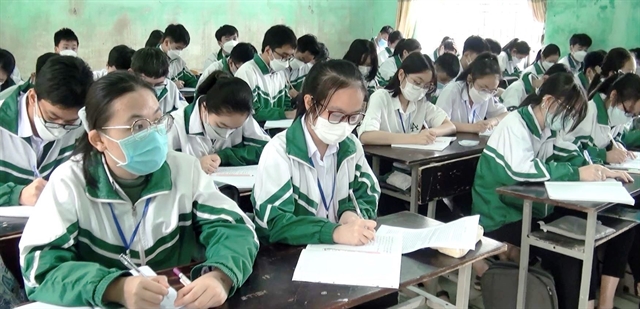
HÀ NỘI — As cities and provinces plan to increase tuition fees in K-12 education, the public is raising concerns regarding the affordability for low-income families, and whether the fee increase means an improvement in education quality.
Hà Nội People’s Council recently announced a draft resolution that will increase tuition fees in secondary schools to between VNĐ50,000 (US$2.15) and VNĐ300,000 per month, double the current range of VNĐ19,000 to VNĐ155,000.
HCM City People’s Committee also expected to increase tuition fees to up to VNĐ240,000 per month for all levels of K-12 education, except for primary schools where fees are exempted.
Depending on the area and levels of education, the new amount could be five-fold the current tuition rate.
In Gia Lai Province of the Central Highlands, the monthly fee is expected to be between VNĐ50,000 to VNĐ86,000 for kindergarten and secondary schools, and between VNĐ100,000 to VNĐ133,000 for high schools.
The lowest tuition fee in the province is currently VNĐ15,000 per month, which means the new fee range would be a significant increase.
The change is expected to take effect in the next school year.
Ngô Văn Giang, a resident in Long Biên District, Hà Nội said that disadvantaged families receive support from the government through tuition fee exemption policies.
For middle-income households, the change does not cause much trouble because each month, parents have to spend a much larger sum to put their children through extra classes after school.
Giang believed that the fee increase is necessary. However, the main concern is whether the change comes with quality improvement.
“When tuition fees increase, so must the education quality.
“If we can improve salaries for teachers so that they are more motivated to continue and dedicate to their profession, and that the students have the best environment for education that they don’t have to attend extra classes after school, then I believe that despite the challenges, all parents would agree with increasing school fees,” said Giang.
A biology teacher in Hà Nội, Đinh Đức Hiền, said that the current tuition rate takes into consideration the economic conditions of each area, the residents’ actual financial capacity, and the annual growth rate of the consumer price index (CPI), all within the Government’s legal framework.
Hiền said: “In reality, many cities and provinces have an annual increase of about 7.5 per cent in tuition fee, in accordance with the CPI.
“This amount is spent on wage reform according to the laws, and on improving the infrastructure and education quality.”
He explained that people’s first reaction to cost increase, in any life aspect, is resistance. Therefore, what is important is rationality and timing.
“In fact, many other expenses during the school year are much higher than the tuition fee. We must eradicate overcharging in schools – that’s what causes frustration among parents, rather than tuition fee itself,” said Hiền.
According to Hồ Tấn Minh, head of the office of HCM City Department of Education and Training, tuition fees only make up a small amount of the school’s expenditure on extra activities for students.
He added that every year, the city set out a budget for the education sector.
Minh said: “In the past six years, while tuition fees have not increased, the city’s education quality always does.
“Increasing the quality of education is a political mission unrelated to tuition fees. Whether the fees are increased or not, education quality must be the best possible.”
Đào Hải Yến, deputy head of the planning and finance division at Hà Nội Department of Education and Training, the new framework proposes tuition fee ranges in the 2022-2025 period. The ranges are specified for each education level in urban, rural, mountainous and ethnic minority areas.
Based on the Government’s framework, local People’s Councils will decide on the specific amount for each school in each area.
In the first year of implementation, Hà Nội expects to apply the lowest fee level for all regions and schools, then proceed to increase the amount in the following years.
Yến said that the Government’s regulations allow localities to increase tuition fees each year, up to 7.5 per cent.
In 2026, the tuition fee range could differ when a new decree is introduced. — VNS
- Reduce Hair Loss with PURA D’OR Gold Label Shampoo
- Castor Oil Has Made a “Huge” Difference With Hair and Brow Growth
- Excessive hair loss in men: Signs of illness that cannot be subjective
- Dịch Vụ SEO Website ở Los Angeles, CA: đưa trang web doanh nghiệp bạn lên top Google
- Nails Salon Sierra Madre
 VnExpress News The News Gateway of Vietnam
VnExpress News The News Gateway of Vietnam





